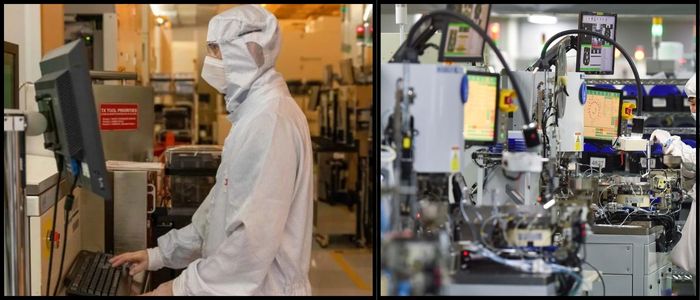Nexperia is located in the Netherlands, but is owned by a Chinese technology company called Wingtech. Following the announcement, Wingtech stated on Monday they will pursue all legal measures to protect their rights and will seek to engage with legal authorities directed by their external legal counsel.
They reiterated their interest to cooperate while also addressing their rights to protect their business interests, which may have serious ramifications for Wingtech to operate in Europe.
This news comes amidst increasing tensions between the European Union and China over trade issues and Beijing's financial/strategic ties to Russia. The scrutiny on Nexperia may also be part of a wider global storyline about critical ownership regarding Chinese-owned assets.
Dutch Government Claims Security and Governance Issues
In the statement from the Dutch government, the Ministry of Economic Affairs exercised its authority under the Goods Availability Act to take action in light of "acute signals of serious governance issues" at Nexperia. The Goods Availability Act provides the government with a rare and exceptional ability to intervene in private sector engagements under circumstances when public or national security is placed in jeopardy or threatened in the economic transactional space.
The main objective of this legislation is to safeguard the availability and continuity of vital goods, technology, and services critical to the Dutch economy and overall European stability.
Through this act, the Hague is attempting to move forward to ensure that Nexperia will not be impacted by supply disruptions, particularly in an emergency that may affect industries dependent upon these chip components.
The offices of the measure stated they needed to protect the "continuity and safeguarding on Dutch and European soil of crucial technological knowledge, and capabilities." This has been stated in the public interest, with the doomsaying of loss of any such production leaving both national and regional economies in a vulnerable situation, particularly in the semiconductor supply chain, an absolute baseline requirement for the technology and manufacturing of today.
Nexperia will be allowed to continue its normal operations despite the government's interventions. This indicates that the measure is largely preventive, consistent with the administrative roll of the mission, and not punitive in nature, which would halt production, consistent with authorities focusing on monitoring and securing the firm's management and capabilities, not the eventual production and outcomes.
Nexperia Global Operations and Rising Tensions
Nexperia is fundamentally a semiconductor manufacturer that produces chips used across trucks, smart phones, and consumer product electronics. The chips, therefore, play a fundamentally important role in global supply chains that support multiple industries that stretch across Europe and beyond. Nexperia is not the first company to face scrutiny in the past, or more recently, national security measures related to its eroding capabilities.
Previously, Nexperia faced pressure from UK politicians and ministers that led to the divestiture of their semiconductor facility in Newport, Wales. Pressure was placed on Parliament members who voiced concerns regarding national security based on Chinese ownership of manufacturing. Nexperia continues to operate another facility in Stockport, UK, and has drawn scrutiny yet again for potential connections to Wingtech.
The latest action taken by the Netherlands signifies the continued easing into similar actions from other Western nations who are reassessing their economic dependency on China.
The European Union especially has been actively working to reposition a new dependency on countries not affiliated with the EU for critical components that include semiconductors, batteries, and rare earth materials.
Wingtech shares listed on Shanghai dropped 10 percent on Monday morning after the announcements from the Netherlands, which suggests investor concerns on the implications of the Dutch decision.
Analysts noted these types of actions will only serve to further entrench barriers for any future Chinese investments into high-technology industries in Europe.
U.S. Actions and Geopolitical Context
Wingtech does not just face challenges in Europe. Wingtech is already on the U.S. entity list, which limits U.S. manufacturers ' ability to export goods or technology to specific foreign companies without obtaining special approval from the U.S. government.
The entity listing serves as part of the broader efforts of the U.S. government to control the flow of technology being transferred to China through companies identified as security risks or companies identified as having strategic risks.
In September, the U.S. Department of Commerce tightened these export controls yet again and added to its entity list any corporation that is majority-owned by a Chinese corporation. This means that Wingtech and its subsidiaries, including Nexperia, will continue to experience increasing barriers if they attempt to access advanced manufacturing technology and/or collaborate with U.S. companies.
The demonstrated efforts by Western nations show a broader effort to protect strategic industries, control intellectual property leakage, and avoid losing critical supply chains.
The Netherlands also recently demonstrated its commitment to secure initiatives with the EU and partner nations while also facilitating stability in its technology supply network.
World

Netherlands Intervenes in China-Owned Nexperia Over Security Risk

The government of the Netherlands has made a "highly exceptional decision" to intervene in the affairs of Chinese-owned semiconductor manufacturer Nexperia due to the risk to Dutch and European economic security. This is another example of increasing trepidation in Europe about foreign ownership, particularly Chinese, of key technologies and infrastructure that provide strategic control over critical sectors.















